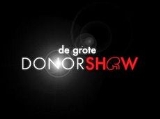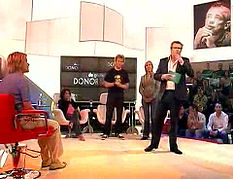
De Grote Donorshow
Encyclopedia

Hoax
A hoax is a deliberately fabricated falsehood made to masquerade as truth. It is distinguishable from errors in observation or judgment, or rumors, urban legends, pseudosciences or April Fools' Day events that are passed along in good faith by believers or as jokes.-Definition:The British...
reality television
Reality television
Reality television is a genre of television programming that presents purportedly unscripted dramatic or humorous situations, documents actual events, and usually features ordinary people instead of professional actors, sometimes in a contest or other situation where a prize is awarded...
program which was broadcast in the Netherlands
Netherlands
The Netherlands is a constituent country of the Kingdom of the Netherlands, located mainly in North-West Europe and with several islands in the Caribbean. Mainland Netherlands borders the North Sea to the north and west, Belgium to the south, and Germany to the east, and shares maritime borders...
on Friday, June 1, 2007 by BNN. The program involved a supposedly terminally ill
Terminal illness
Terminal illness is a medical term popularized in the 20th century to describe a disease that cannot be cured or adequately treated and that is reasonably expected to result in the death of the patient within a short period of time. This term is more commonly used for progressive diseases such as...
37-year-old woman donating
Organ donation
Organ donation is the donation of biological tissue or an organ of the human body, from a living or dead person to a living recipient in need of a transplantation. Transplantable organs and tissues are removed in a surgical procedure following a determination, based on the donor's medical and...
a kidney
Kidney
The kidneys, organs with several functions, serve essential regulatory roles in most animals, including vertebrates and some invertebrates. They are essential in the urinary system and also serve homeostatic functions such as the regulation of electrolytes, maintenance of acid–base balance, and...
to one of twentyfive people requiring a kidney transplantation
Kidney transplantation
Kidney transplantation or renal transplantation is the organ transplant of a kidney into a patient with end-stage renal disease. Kidney transplantation is typically classified as deceased-donor or living-donor transplantation depending on the source of the donor organ...
. After a first selection, three people remained. Viewers were able to send advice on who they thought she should choose to give her kidney to via text messages
Text messaging
Text messaging, or texting, refers to the exchange of brief written text messages between fixed-line phone or mobile phone and fixed or portable devices over a network...
. The profit made by the text messages was given to the Dutch Kidney Foundation. The program, due to its controversial
Controversy
Controversy is a state of prolonged public dispute or debate, usually concerning a matter of opinion. The word was coined from the Latin controversia, as a composite of controversus – "turned in an opposite direction," from contra – "against" – and vertere – to turn, or versus , hence, "to turn...
nature, had received heavy international criticism in the run up to the broadcast. In the end, it was revealed during the course of the show that the terminally ill woman was, in reality, an actress, although the three candidates were, in fact, real kidney patients; they were aware of the fact that Lisa was an actress, and participated because they were supportive of BNN's cause to give awareness to the limited number of organ donors in the Netherlands.
In a press statement after the show, Paul Römer, the director of the program's creator Endemol
Endemol
Endemol is an international television production and distribution company based in the Netherlands, with subsidiaries and joint ventures in 23 countries, including the United Kingdom, the United States, France, Mexico, Spain, Italy, Germany, Brazil, Chile, Argentina, Dominican Republic, Poland,...
, stated that the show was necessary in order to get the shortage of donors back on the political agenda.
Background
Bart de GraaffBart de Graaff
Bart F. de Graaff was an influential Dutch television presenter and creator, as well as the founder and chairman of the public broadcasting network BNN....
, the BNN founder who died in May 2002 (almost exactly 5 years before the broadcast of the show), obtained a donor kidney in 1997. De Graaff had renal failure
Renal failure
Renal failure or kidney failure describes a medical condition in which the kidneys fail to adequately filter toxins and waste products from the blood...
stemming from a car accident in his youth. The studio from which the show was aired contained photos of him, as seen on the picture to the right. It has been claimed that De Graaff was BNN's source of inspiration for the show, both by the show's host, Lodiers, as well as in the post-broadcast press release.
Prior to the airing of the show
Joop Atsma, a member of the House of Representatives for the Christian Democratic AppealChristian Democratic Appeal
The Christian Democratic Appeal is a centre-right Dutch Christian democratic political party. It suffered severe losses in the 2010 elections and fell from the first to the fourth place...
, had attempted to censor the show. Dutch culture minister Ronald Plasterk
Ronald Plasterk
Ronald Hans Anton Plasterk is a Dutch politician of the Labour Party . He was Minister of Education, Culture and Science from February 22, 2007 until February 23, 2010 in the Cabinet Balkenende IV. He has been a Member of the House of Representatives since June 17, 2010. He focuses on matters of...
, citing Dutch law, refused to prohibit the television program, although he found the program to be unethical due to its competitive element. Before the show aired, the Dutch Kidney Foundation told a reporter "they welcomed all the attention the show had brought on the subject" but also stated that "their way of doing it is not ours, and it will bring no practical solution". In a press statement, the foundation also stated that they had asked BNN to cease using their logo in The Big Donor Show's logo (note the icon of a kidney instead of an "o" in the logo, as seen at the top right of the page), for which BNN had never asked permission. The Dutch prime minister, Jan Peter Balkenende
Jan Peter Balkenende
Jan Pieter "Jan Peter" Balkenende is a Dutch politician of the party Christian Democratic Appeal .He was the Prime Minister of the Netherlands from 22 July 2002 until 14 October 2010, having led four coalition governments, cabinets Balkenende I, II, III and IV, none of which served a full...
, had expressed his concerns for what he believed would damage the reputation of the Netherlands.
Laurens Drillich, the chairman of BNN
BNN (television)
BNN or Bart's Neverending Network is a Dutch public broadcasting association supported by the Netherlands Public Broadcasting. BNN was founded in 1997 by Bart de Graaff, Gerard Timmer & Frank Timmer, and targets teenage and young adult audiences...
at the time, defended the program and argued that the network deliberately wants to shock people and draw attention to the shortage of organ donors
Organ donation
Organ donation is the donation of biological tissue or an organ of the human body, from a living or dead person to a living recipient in need of a transplantation. Transplantable organs and tissues are removed in a surgical procedure following a determination, based on the donor's medical and...
. "We very much agree that it's bad taste but we also believe that reality is even worse taste. I mean, it's going very, very bad with organ donorship in the Netherlands. We as a broadcaster, BNN, had someone who started our TV station who needed kidneys and was on a waiting list and died eventually at the age of 35. That happened five years ago and in the last five years the situation has only gotten worse in the Netherlands."
After the airing of the show
In a press statement after the show, the director of Endemol, Paul Römer, stated "Let there be no misunderstanding, I would never make a program such as 'The Big Donor Show' for real. I do understand the massive outrage very well. But I also hope for people to understand why we did this. It was necessary to get the shortage of donors back on the political agenda. I call up everybody to get very angry about that, and to fill in a donor form."Minister of Education, Culture, and Science Ronald Plasterk told the press he now thought that "the show had been a fantastic idea, and a great stunt". Joop Atsma, MP for the Christian Democrats, who had previously attempted to prohibit the show, has called it a "tasteless show", and claimed that he feels it didn't contribute to the solving of the problem.
A few hours after the show BNN had already received SMS
SMS
SMS is a form of text messaging communication on phones and mobile phones. The terms SMS or sms may also refer to:- Computer hardware :...
messages from over 12,000 viewers who told the network that they would fill in a donor form. After a day 30,000 donor forms were requested, and two days after the show the official Dutch TV news broadcast "NOS News
NOS News
NOS Journaal is the broadcast supplier of news to Dutch public radio and television. It is part of the Nederlandse Omroep Stichting.The 'NOS Journaal' editorial team consists of 7 editors-in-chief, led by the chief editor. Until 1 July 2011 Hans Laroes was editor in chief. On 25th January 2011...
" announced that 50,000 people had requested a donor form to be sent to them, a figure that is expected to still rise. In July, a month after the show aired, 7,300 new donors were registered by the Dutch donor registration.
Laurens Drillich, BNN's chairman, told the press "It was very hard to keep this a secret, and to tell this lie time after time, but I did it because of the good cause."
Dutch TV moment of the year 2007
On January 12, 2008, the scene during which Patrick LodiersPatrick Lodiers
Patrick Emanuel Martinus Lodiers is a Dutch television presenter and the chairman of BNN.Lodiers is the presenter of Dutch programs like De Lama's, Over Mijn Lijk and The Big Donor Show....
revealed that the show was a hoax with the purpose of drawing attention to the Dutch donor shortage problem was voted as the best Dutch TV moment of the year 2007. During a brief speech, the chairman of BNN
BNN
BNN is a three letter abbreviation which can refer to*Banana News Network, A Pakistani comedy TV Show.*Bart's Neverending Network , a radio and television broadcasting organization in the Netherlands...
, Laurens Drillich, said the following: "The show was aired in June, today is January. Dutch politicians promised to put donor shortage on their agenda. We're still waiting for a reaction."
External links
BNN.NL: De Grote Donorshow Full Broadcast from the Nederlandse Omroep StichtingNederlandse Omroep Stichting
The Nederlandse Omroep Stichting , English: Netherlands Broadcasting Foundation, is one of the broadcasters in the Netherlands Public Broadcasting system...

